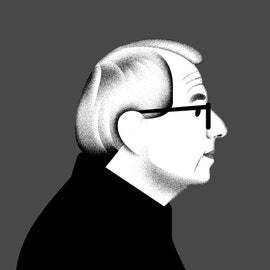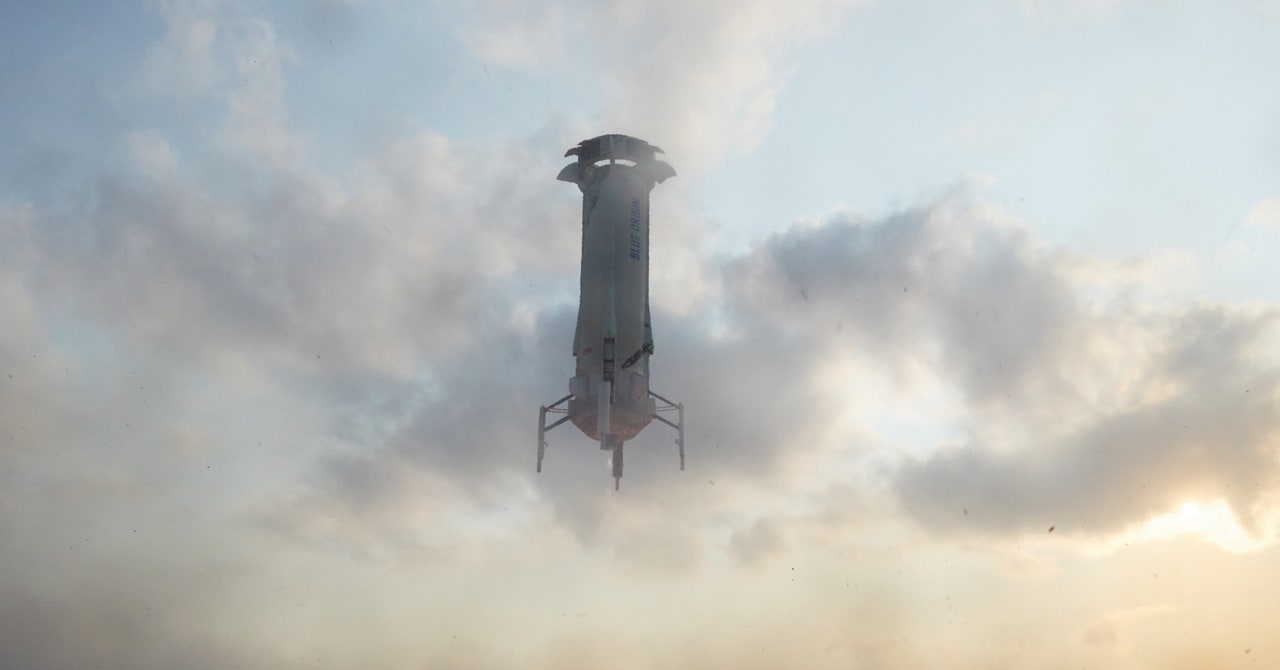
This month has been all about how viewing the Earth from space—even the dicey definition of “space” from a barely-there demarcation of either 50 or 60 miles—will change your life, make you realize that we’re all in this together, and put you face-to-face with God, without a Covid mask.
That was readily apparent when Bezos and his three crewmates on Blue Origin’s New Shepard suborbital rocket returned from their 10-minute journey. All four agreed that space was an awesome, life-changing experience. In his first broadcast interview, Bezos first said that it was so overwhelming that he didn’t have the verbal skills to express it—maybe only a poet could do that. Later, in a postflight press conference, he attempted it.
“OH MY GOD!” was his first reply to the question on how it felt. Then he got very quiet and tried to describe a feeling where, almost like the end of Kubrick’s 2001, space had taken him to a primal restoration of the human state. “It felt so normal, even as if humans were evolved to be in that environment, which I know isn’t possible, but it felt so serene, and peaceful.”
And sure, Bezos cares deeply about the environment—he’s put $10 billion into a climate fund—but he really didn’t get how fragile the Earth was until he peered down on it from above the Kármán line. “The most profound thing for me was looking at the Earth, and looking at the Earth’s atmosphere,” he said. “When we’re driving around in our cars, the atmosphere is so gigantic, and we’re tiny things, and the atmosphere is so big. But when you get above it, you see it’s incredibly thin! It’s this tiny little fragile thing. It’s one thing to recognize it intellectually; it’s another thing to see it.”
This came on the heels of similarly dreamy exclamations by another space billionaire, Richard Branson, who also portrayed his own self-financed suborbital jaunt as something beyond human language. “I’m never going to be able to do justice to it,” he said at his own press conference. “It’s indescribably beautiful.” A word he kept using was “inspiration”—space, in his view, was not an infinite void but a life-changing mountaintop that symbolizes what humans could accomplish.
Even Virgin’s lead operations engineer, Colin Bennett, who was on the flight, hopped onto the awe train, depicting space as kind of a heaven. “It’s very zen,” he said. “It’s very peaceful up there as well. What jumped out at me were the colors and how far away it looked … I was just mesmerized.”
Space travel, it seems, is all about inspiration, beauty, and returning … to our natural state?
Of course, we’ve already heard plenty about the intangible magic of gazing down at Earth from NASA astronauts who happened to experience spiritual moments in the course of their work. But as people increasingly visit space not to work, but to indulge in a life-changing experience, revelation moves from a serendipitous side effect to the point of the matter. The premise of space tourism isn’t exactly guaranteed satori, but it’s certainly implied. (That, and a lot of fun floating around. Video from RSS First Step, the capsule of New Shepard, showed the crew tumbling and playing, tossing a ball, and pitching gravity-free Skittles at each other.)
But even as Jeff Bezos was gushing about the amazeball-ness of his flirtation with space, the fact is that ultimately, all of that mumbo jumbo is secondary to him. The thrills and revelations of space travel are but enablers of the main reason he started Blue Origin: to begin a journey on which millions of human beings would leave the Earth to live and reproduce in space colonies, extending our species to over a trillion souls.
He was explicit about it when I spoke to him in 2018: “I like the adventure of space; that’s great,” he said. “But that pales in comparison to the importance of making sure that our grandchildren’s grandchildren don’t face a life of stasis. Basically, we have a choice to make as a civilization, which is, Do we expand into the solar system or do we accept stasis here on Earth? There have been many reasons over the years that people have given for why we need to go to space, and this is the only one that I personally find super motivating.”
Yesterday at his postflight press conference, he repeated the message, though tactically avoided explicit talk of space colonies. “What we are doing is not only adventure,” he said. “It’s also important. Because what we are doing is something big … We’re going to build a road to space so that our kids—and their kids—can build a future.”
He went on to insist that his goal wasn’t escaping Earth, but saving it, as it’s “the only good planet in the solar system.” But as I understood him from hours of conversation in 2018, he sees Earth as a preserve, a haven, that can be conserved once destructive manufacturing is moved to the unimaginable vastness of space, so the natural ecology can prosper. People still living here will be Earth’s caretakers. The huge population of humans living in lush galactic colonies—think not of the cramped International Space Station, but massive verdant structures with lakes, shopping malls, and stadiums—can return to their home planet for visits or residencies.
This is the dream Bezos has nurtured since high school, when he idolized futurist Gerald O’Neill, who popularized the space colony vision, and the future Blue Origin founder even devoted his own high school graduation speech to the subject. Space tourism, as he said yesterday, is a small step toward that. His goal is to catalyze a mighty industry of space businesses. While his competitive juices lead him to compete with Virgin Galactic and especially SpaceX, his rival for government contracts, he’s rooting for them because he believes that an infrastructure for space ventures will advance that very long-term dream, which he believes is inevitable if civilization is to prosper.
Seen in that light, Bezos’ emphasis on enlightenment was business. If you are going to charge people hundreds of thousands of dollars for a suborbital ride, it helps to be offering more than an adult bounce house. Bezos says Blue Origin has already lined up $100 million in passenger commitments, will do two more flights this year, and hopes to step up the cadence. Practice in launching and reusing rockets and settling into a routine flight schedule will help Blue Origin, and others, bring down the price, concoct innovations, and eventually develop that space infrastructure Bezos wants. Once it’s built, entrepreneurs will be able to enter the field with much less capital. We’ll have bustling business in all sorts of new satellite technologies, and, as the action shifts beyond orbiting to the moon and planets, off-Earth manufacturing will become possible. At least, according to the Bezos, that’s the dream.
And that’s why I feel that, even though the achievement of suborbital space was pretty much accomplished and shelved in 1961, the flight of New Shepard in the Texas desert this week was worth our close attention. “This is going to take decades—this is a big vision,” Bezos said yesterday. “Big things start small, and this is how it starts.”
I’m not quite sure that I buy into his arguments that so much of humanity has to live off the planet to thrive. And I’m bothered that, right now, private space travel is the plaything of billionaires. But the world’s richest man and one of the smartest, a man who has built one of the world’s biggest businesses, is seriously pursuing what would literally be a world-changing process. That’s a hell of a story.
Lire l’article complet sur : www.wired.com



Leave A Comment